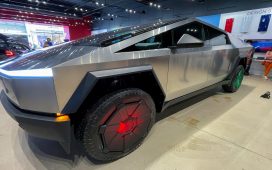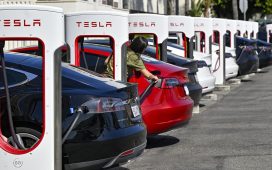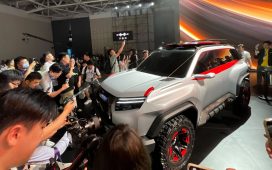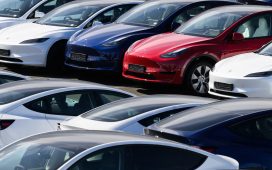“Woven Planet really needs to grow in order to be able to fulfill that mission and that mandate.”
Kuffner, the American computer guru who also sits on Toyota Motor’s board, is tasked with making the world’s biggest automaker as strong in software as it is in hardware. The goal is rooted in the new conventional wisdom that future value in the auto industry will come not necessarily from manufacturing vehicles but from selling the software and services that support them.
That business formula was the path of other industries, such as the mobile phone business, where handset makers were relegated to commodity status while providers of the software inside and the commercial services available over those phones cleaned up on revenue growth and profits.
Scooping up Lyft’s in-house autonomous-driving unit also underscores two new industry trends.
The first is that ride-hailing companies increasingly find it difficult to float their own self-driving vehicle projects. Uber Technologies conceded as much in December when it sold its self-driving division to Aurora Innovation, another startup focused solely on the software side.
The second is that old-guard automakers can seize on this consolidation among upstart entrants to poach potent brainpower in fields where they find it hard to compete.
The transition to software is a maneuver being attempted not only by Toyota but also by its global competitors, such as Volkswagen and Tesla.
But as outsiders to the digitized tech world, traditional automakers are ramping up from next to nothing in these new arenas. Analysts say reaching scale is key.
“It runs contrary to the culture of just about every automaker, but they are well advised to make the shift,” said Christopher Richter, lead Asia auto analyst at CLSA in Tokyo. “Standing still creates a 100 percent probability of failure.
“One of the questions Toyota has long faced was, ‘How do you get access to all the great software engineers?’ Well, you buy the company they work for.”
Acquiring Lyft’s Level 5 self-driving unit boosts Woven Planet’s global engineering head count to 1,200 computer experts. Many have more than a decade of experience in vital fields such as cloud-based services, Kuffner notes, and nearly a quarter of the newcomers have doctoral degrees in mission-critical areas such as machine learning and computer vision.
“It’s quantity times quality equals impact,” Kuffner said. “We need great people and world-class employees at scale in order to have the impact we’re hoping for. Even if I hire three engineers a week, it will take me two years to get over 300 engineers with this kind of skill and experience.”
Last summer, when it was announced that Woven Planet Holdings would be formed out of its predecessor company, Toyota Research Institute-Advanced Development, the company had 560 employees. The goal at that time was to expand beyond 1,000. As of April 1, it had reached 760.
Last week’s acquisition also gives Woven Planet a more international footprint, with new offices in Palo Alto, Calif., and London. Kuffner also has a personal connection with Luc Vincent, executive vice president in charge of Lyft’s autonomous technology: They worked together at Google.
Human capital gives a competitive edge in the new automotive battlegrounds.
Parent company Toyota said last month that it will double the percentage of software engineers it recruits this year as part of its annual crop of new hires. Last year, 20 percent of engineering hires were in software. This year, it will be 40 to 50 percent.
Kuffner’s long-term recruitment goal is to grow into tens of thousands. By comparison, supplier Robert Bosch said last year it would create its own software-focused unit with 17,000 employees.
Reaching that level will necessitate more partnerships and acquisitions, Kuffner said.
“We have this mandate to grow our company,” he said. “When exciting new companies or new partners show up, we want to be able to quickly invest or to do joint development to engage so that we can learn and be state of the art and cutting edge with everything that we’re doing.”
Woven Planet is flexible in how it pursues that end.
Expansion can come through straight buyouts, such as the Lyft purchase. Or it can come via piecemeal investments in promising new technologies through a separate $800 million Woven Capital investment fund. The fund announced its first outlay in March, an equity stake in Nuro Inc., the robotics company that is developing four-wheeled autonomous delivery runabouts.
For Kuffner, the trick will be balancing rapid growth with sustainability. The danger is becoming bloated and bureaucratic, weighed down by overhead and overcomplexity.
It’s a phenomenon Toyota Motor has known firsthand for a long time.
Woven Planet’s holding company structure is designed to alleviate that pressure by absorbing back-office services, such as information technology, legal and finance. That allows its individual business units to focus on the nuts and bolts of developing products and technologies.
“I’m always trying to balance the speed at which we can grow versus keeping the team small and focused and moving fast,” Kuffner said.
“Growing too fast has a lot of risks, but also not growing big enough has other risks.”








